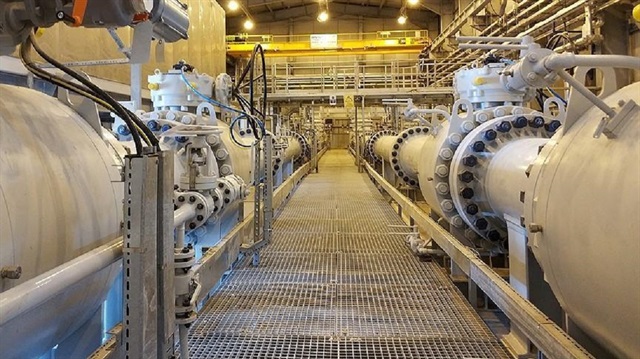
US government supports project on policy basis despite no direct investment in project, says US official
The U.S. government largely supports the Trans Anatolian Natural Gas Pipeline Project (TANAP), despite not being a direct investor in the project, Sandra Oudkirk, deputy assistant secretary in the U.S. Bureau of Energy Resources said Tuesday.
Oudkirk told journalists in the Turkish capital Ankara that TANAP would bring diversification of supply and energy security to European countries and to Turkey
“TANAP is a strong additional element for energy security for Turkey and Europe,” she said and added, “The U.S. government supports the project on a policy basis. We are supporting it even though there is no direct investment in it.”
The Presidents of Turkey, Azerbaijan, Georgia and Ukraine will attend the official launch of TANAP in Turkey's Eskisehir province on Tuesday, June 12.
“The launching of TANAP on Tuesday is really good news. There are lots of bad, challenging and difficult news around the world but TANAP is universally good. As the U.S., we consider energy security for ourselves and our allies as very important,” Oudkirk underlined.
TANAP is a natural gas pipeline that will stretch from the Turkey-Georgia border to the Turkey-Greece border to supply natural gas both to Turkey and also to European countries.
The 1,850-kilometer-long TANAP is the largest section of the 3,500-kilometer-long Southern Gas Corridor, which was officially inaugurated on May 29 during a ceremony held in Baku with the participation of Azerbaijan President Ilham Aliyev.
TANAP, with around $8 billion of investment, will deliver 6 billion cubic meters of Azeri gas to Turkey and 10 billion to Europe per year. The European part of the project is expected to become operational in 2020.
Currently, the Southern Gas Corridor Company holds a 51 percent share, Turkey's BOTAS has a 30 percent interest, BP holds 12 percent and SOCAR Turkey has the remaining 7 percent.
Oudkirk also said that two criteria are central when the U.S. considers support for a European gas project, the first being the effect of the project on Ukraine and the second related to energy security.
“Turkey is a big country and economically diversified,” the official said, adding that Turkey with its many energy resources is very different to that of other European countries like Bulgaria that is 100 percent reliant on Russian gas.
“When we look at the projects such as the Nord Stream 2, TurkStream’s second line and the former South Stream, we consider two things. First, we look at the effect on Ukraine as the Russian government no longer wants to transit gas through Ukraine. That would be very bad news for Ukraine,” she said.
She added "the second thing we look at is energy security for countries in Europe. We fully support diversification of energy supplies."
TurkStream is a natural gas pipeline project, consisting of two lines. The first line of the project will bring 15.75 billion cubic meters of gas to Turkey and the second line will supply gas to Europe.
To realize the second line, negotiations are ongoing with Bulgaria and Greece.
Both of the project’s lines will bypass Ukraine and send gas directly to Turkey and Europe.
Hello, the comments you share on our site are a valuable resource for other users. Please respect other users and different opinions. Do not use rude, offensive, derogatory, or discriminatory language.
The floor is all yours.








